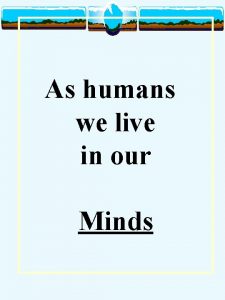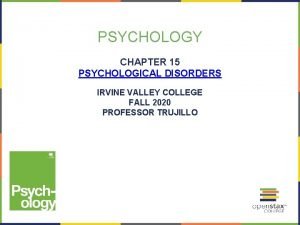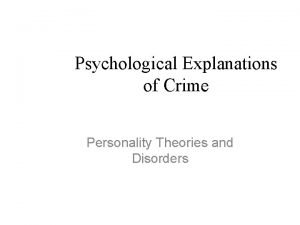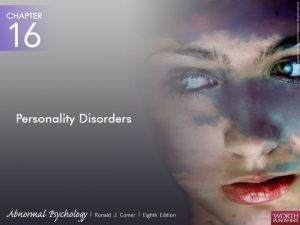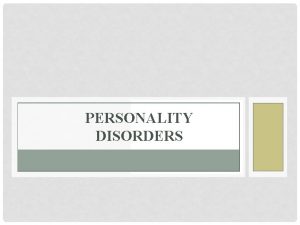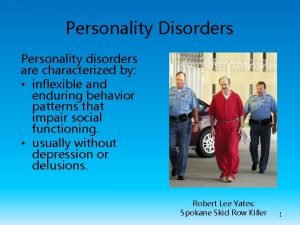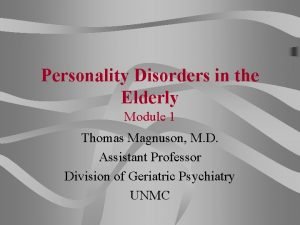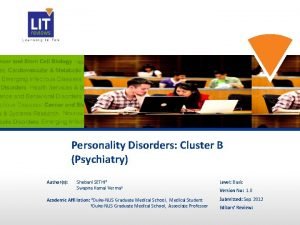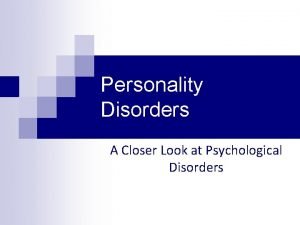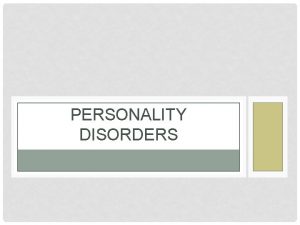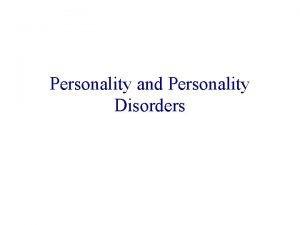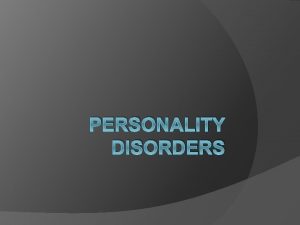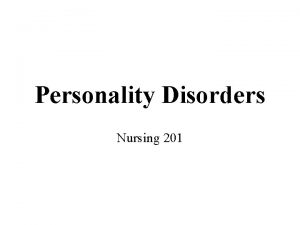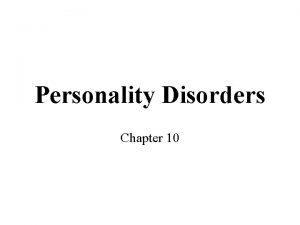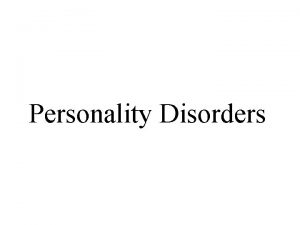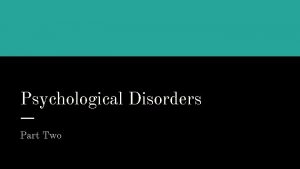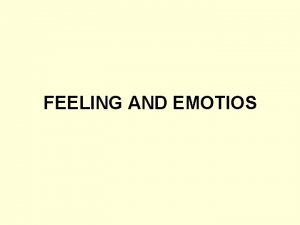PERSONALITY DISORDERS Extreme patterns of thinking feeling and













- Slides: 13

PERSONALITY DISORDERS Extreme patterns of thinking, feeling, and behaving that are different from a person’s culture

Types of PD’s � Begin early in life and generally do not change � Cause significant problems in life and personal distress � Cluster A = suspicious � Cluster B = emotional and � impulsive � Cluster C = anxious

Suspicious: Paranoid suspicious, feel others are against them � sensitive to rejection and hold grudges � see hidden messages in other's comments � appear cold and serious � How might this person react to being randomly pulled over by the police? �

Suspicious: Schizoid emotionally cold � prefer own company, loners � no need for friends, sex � have fantasy world � � Question: Why wouldn't this person feel lonely?

Suspicious: Schizotypal � � � odd ideas, magical thinking difficulties with thinking lack of emotion. may see or hear strange things a distant cousin of schizophrenia Question: What would you guess that magical thinking is? �

Emotional: Anti. Social � no care for feelings of other � easily frustrated and aggressive � avoid intimacy – relationship are only for self gain.

Psychopathy: Antisocial � � � lack of feeling for others - no remorse use and manipulate other people Human Predators No conscience early behavior problems � Questions: What early behavioral Problems might there be?

Emotional: Borderline � emotionally unstable � impulsive low self-worth � everything is “good” or “bad” � intense, unstable relationships � self-harm � Question: Why do you think this type of person is prone to slashing? �

Emotional: Histrionic over dramatic and self-centred � show strong emotions which change and don’t last � crave new things, excitement. � attention seeking- seeks reassurance � very seductive - "the life of the party" �

Emotional: Narcissistic strong sense of self-importance dream of power, success crave attention of others, no warm feelings in return � exploits and manipulates others � exaggerates/lies about accomplishments � sensitive to criticism � � �

Anxious: Obsessive. Compulsive worry, doubt perfectionist - rigid - workaholic worry about doing wrong thing high moral standards - judgmental of others � obsessed with trivial details � humorless � Question: Why would this person be so quick to judge others? � �

Anxious: Avoidant � � � anxious, tense insecure, feelings of inferiority have to be liked, accepted sensitive to criticism. scared of social situations, but lonely Question: What kind of early trauma might have resulted in this disorder?

Anxious: Dependent passive - rely on others to make decisions � feel incompetent � feel abandoned by others � submissive, clingy behavior � fear of separation � � Why might this type of person have problems with relationships?
 Ecu camera angle
Ecu camera angle Characteristic patterns
Characteristic patterns Thinking feeling intuition sensing
Thinking feeling intuition sensing Thinking feeling
Thinking feeling Thinking feeling
Thinking feeling Thinking feeling
Thinking feeling Different personality disorders
Different personality disorders Cluster b personality disorder
Cluster b personality disorder Avoidant personality traits
Avoidant personality traits Personality disorders dsm 5
Personality disorders dsm 5 Inflexible personality
Inflexible personality Cluster c personality disorders symptoms
Cluster c personality disorders symptoms Cluster b personality disorder
Cluster b personality disorder Paranoid pd
Paranoid pd





